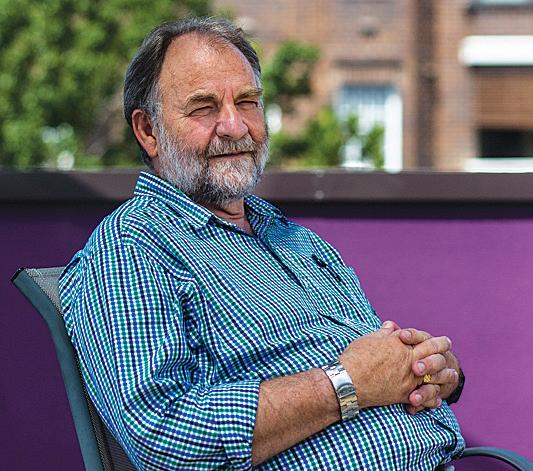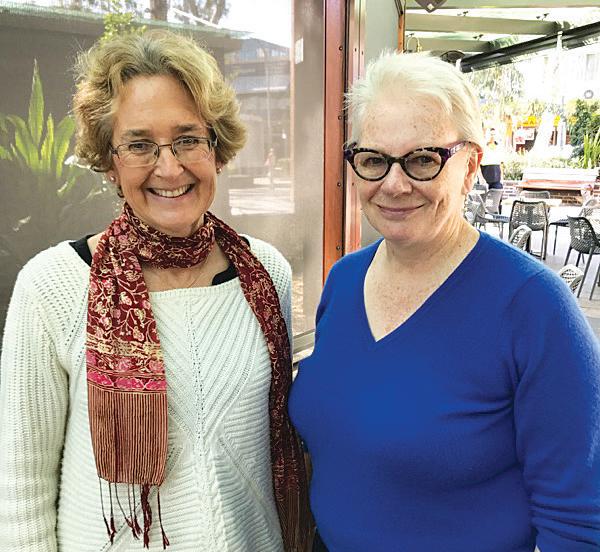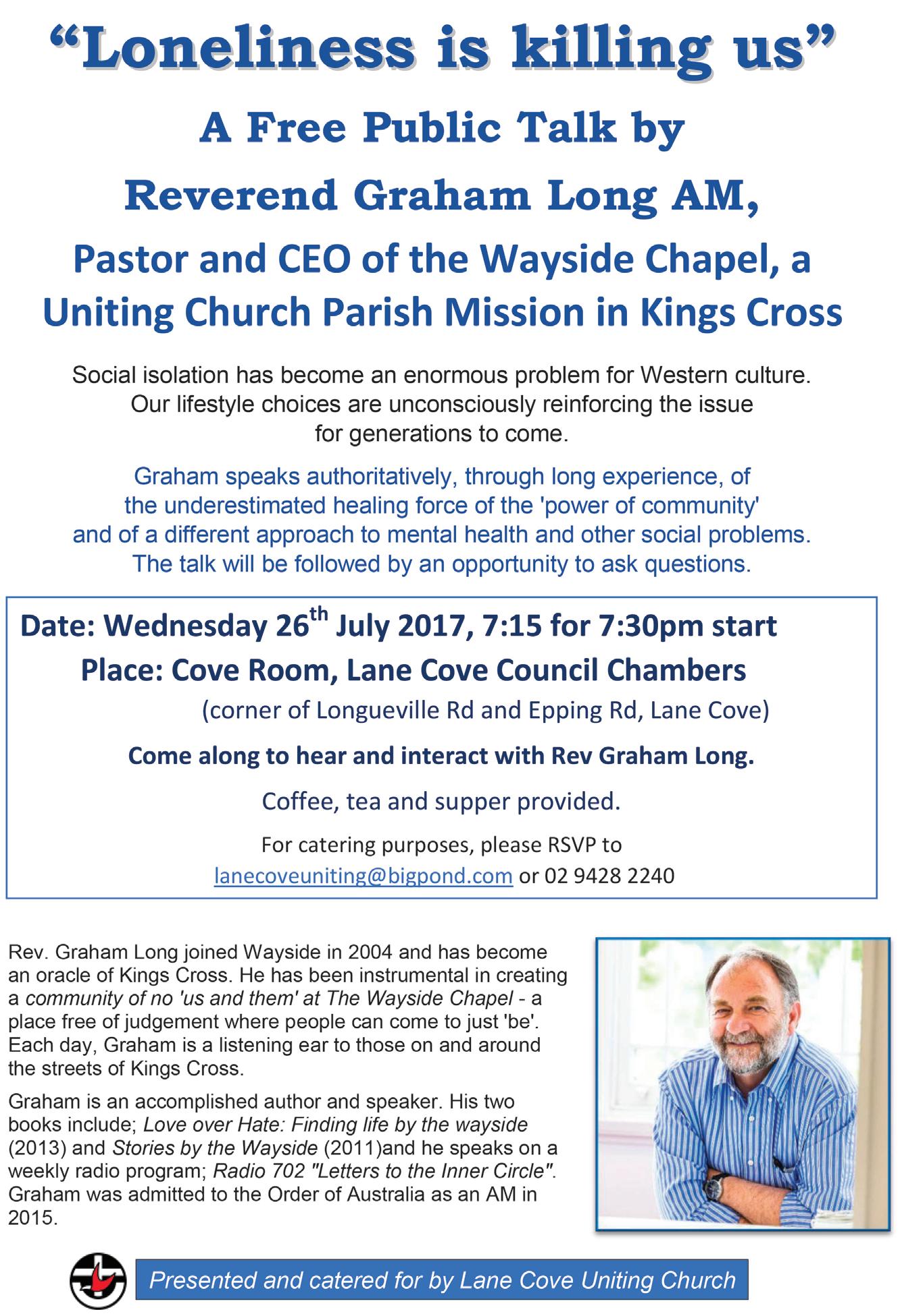
6 minute read
Loneliness – is it killing us?
Loneliness and social isolation not only impact our emotional wellbeing. Research is now showing that they are also harmful to our physical health. In fact, one research study has shown that a lack of social connections may be as damaging to our health as smoking 15 cigarettes a day*. By Jocelyn Biddle.
The corollary to this is that friends and strong social connections can help you live longer and better.
Professor Julianne Holt-Lunstad is a Professor of Psychology and Neuroscience at Brigham Young University in Utah. Her research has looked at the associations between social relationships and long-term health outcomes.
In a research paper entitled Social Relationships and Mortality Risk: A Metaanalytic Review, Professor Holt-Lunstad said the effect of loneliness and social isolation is as great a risk factor as obesity and poses a threat to public health.
Reverend Graham Long AM is Pastor and CEO of Wayside Chapel in Kings Cross. In July, Graham is coming to Lane Cove to speak about loneliness and how we can help to guard ourselves against it.
“The truth is that loneliness isn’t defined by the number of bodies around you. It’s about connecting and meeting one another. By enlarge, we tend to relate to one another as problems to be fixed, rather than people to be met, which is very unsatisfying.
‘We’re surrounded by ‘awesome’ all the time, but often we can’t see it. Being in the presence of another human being and maximising opportunities for this to happen is so important.”
Graham says that although loneliness has been a theme for the past 20 years, it is growing at an alarming rate.
Graham joined Wayside in 2004. An oracle of Kings Cross, he has been instrumental in creating a community of no ‘us and them’ at The Wayside Chapel.
Each year, thousands of people visit Wayside for assistance. In an average week, Wayside provides 517 community meals, 319 changes of clothing, 741 instances of health-related support including mental health, and 36 social and recreational activities for the whole community to participate in.
So why is loneliness becoming such an important social issue? Graham believes that our ‘one upmanship culture’ is partly to blame.
“Today it’s increasingly about ‘I’, ‘my’ and ‘me’. ‘My achievement, ‘my success’, ‘my life’ defines disconnection. We have become so busy achieving our own goals, often at the expense of others.
“People are judging themselves by a bunch of criteria that renders loneliness. Getting satisfied with the ‘Power of One’, rather than defining oneself as part of something much bigger, comes at a high price and we’ve now found ourselves on a path where many people are desperately disconnected.
Research undertaken in the US by Professor Holt-Lunstad indicated that individuals with adequate social relationships have a 50% greater likelihood of survival compared to those with poor or insufficient social relationships.
It showed that the magnitude of this effect is comparable with quitting smoking. Interestingly, it remained consistent across a number of factors, including age, sex and health status.
Lifeline Australia conducted a Loneliness Survey in September 2016 which showed that more than 80 per cent of Australians believe our society is becoming a lonelier place, highlighting the lifesaving importance of caring realworld relationships.
“For a society that is more technologically connected than we have ever been, these results suggest we’re overlooking good old-fashioned care and compassion when it comes to our mental health and wellbeing,” said Lifeline Australia CEO Pete Shmigel.
Graham Long agrees that life is passing people by with the hours spent on technology.
Graham says that lifestyle choices being made in the Western world seem to be enforcing the loneliness that is being experienced by increasing numbers of people.
Reverend Graham Long, Pastor and CEO of Wayside Chapel believes that our ‘one upmanship culture’ is partly to blame for the increase in loneliness being experienced in the Western world.

Karen Paull and Lesley Brookes are part of a local group that have helped form the new Australian Coalition to End Loneliness.
In his session, Graham hopes to encourage people to stand back from themselves a little.
To hear Graham speak about this important social issue, come along to the session being hosted by the Lane Cove Uniting Church on Wednesday 26th July at 7.15pm in the Cove Room at Lane Cove Council Chambers. To RSVP, go to lanecoveuniting@bigpond.com or phone 9428 2240.
* Holt-Lunstad, 2015, Loneliness and Social Isolation as Risk Factors for Mortality: A Meta-Analytic Review
Much of the research that currently exists on the impacts of loneliness has emanated from the US.
This is set to change as part of the charter of the developing Australian Coalition to End Loneliness, which aims to raise awareness of loneliness and physical social isolation through evidence-based research and interventions.
A number of Lane Cove residents including Lesley Brookes, Marion Demann, Keith Meyer and Karen Paull have been active in forming the coalition which comprises a scientific advisory committee of leading researchers with an interest in loneliness, from both Australia and abroad.
After experiencing loneliness herself and also recognising it in other people, Lesley Brookes set about looking at what research was available and spoke to experts to better understand the successful interventions that have been introduced to address this issue.
Lesley says that research from the US has shown that loneliness is a physiological response like pain or hunger.
“It can lead to a downward spiral where sufferers have negative expectations, which lead to negative experiences, making them feel all the more lonely.”
The Coalition is currently seeking funding in order to commence the research that will initially focus on three pilot areas, including Lane Cove, the Hawkesbury and a rural South Australia locality, to examine the physiological, psychological, sociological and economic impacts of loneliness.
“We have a rich test site in Lane Cove and as a community, we are facing unique challenges with the large influx of residential apartments and associated demands on resources and infrastructure.
“The research will be looking into the extent and causes of loneliness in the community and whether it has a ‘contagion’ effect, in that it has the potential to transfer to other people.”
Based on the findings, the Coalition is hoping to implement services and social planning strategies to meet the real needs of each community.
“We want to identify the groups most at risk in the community and then develop local assets and resources to help address this.”









